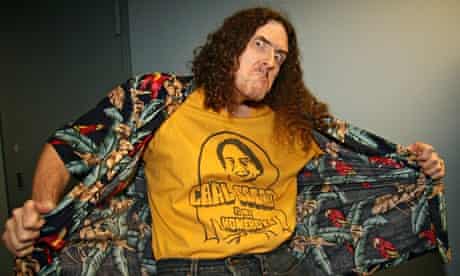Nothing lasts forever but some things last a lot longer than we might think (it’s hard to make introductions to these things that don’t become pandemic mantras). We try to build platforms and art that will endure – or at least predict which things will – but it’s a tricky business. Punchy turns of phrase become iconic calls to a community. Music moves through the generations, and not always from the musicians you’d think. And that gross world parodied in a movie from 20 years ago? Turns out it lingers as well.
Enjoy these articles. I have to return some videotapes.
As his name suggested, Weird Al’s comedy operated right at the hot spot of my childhood agonies: weirdness versus normalcy, insider versus outsider. What a Weird Al parody did was enact a tiny revolution. It took the whole glamorous architecture of American mainstream cool — Michael Jackson’s otherworldly moves, Madonna’s sexual taboos — and extracted all of the coolness. Into that void, Weird Al inserted the least cool person in the world: himself. And by proxy, all the rest of us weirdos, along with our uncool lives.
Willner is best known for producing compilation records and concert events that distilled his fascination with history and unlikely musical mash-ups. He assembled tribute albums, featuring a range of cult stars —and, occasionally, superstars —performing the songbooks of such heroes as Thelonious Monk, Charles Mingus, Kurt Weill and the Italian composer Nino Rota. These were dream mixtapes; they didn’t sell in huge numbers, but they changed the listening habits and expanded the horizons of fans, critics and the musicians themselves.
The interface for Means TV reminds one of a pared-back Netflix, with content divided by format: full-length films, series, comedy, animation, even kids’ content. Wrinkles and Sprinkles, for example, is a kids’ show which finds two cats – one a crusty, wisened elder and one a peppy kitten – learning about direct action and solidarity. Feature-length documentaries detail the Palestinian resistance movement, invasive swamp rats threatening the Louisiana coast’s communities and culture, and indigenous children in Guatemala dodging police in the city while finding ways to provide for their families… Means follows a simple metric for determining suitability of content: “Is this punching up or down? Is this going after people that have more power than us, or is this denigrating people that have less power than us?”
Another great interview by Katie Rife at the AVClub, this time with Mary Harron on American Psycho, the movie that 20 years on will not die:
At the time [it came out], people who didn’t like the film or were dismissive of it were saying, “Oh, well, we knew all that about the ’80s.” But to me, it was never just about the ’80s. It was about American vulture capitalism—and not just American, really. Bateman is the embodiment of everything that’s wrong with [this system], all the worst and craziest forces—obsession with surfaces, obsession with status, obsession with acquisition. And then the frustration and violence—all of those things.
The problem is that Doremus can’t direct his way out of a paper bag, and since he doesn’t like to write scripts (Endings, Beginnings was improvised from a long outline co-written with Jardine Libaire), what we’re left with is an overlong post-mumblecore soap opera that consists in large part of twinkly, shoegaze-adjacent mood-music montages and lens-flare-heavy handheld close-ups of actors pretending to go on dates.


